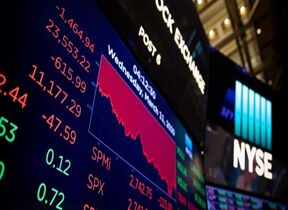美股"熔断" 全球股市下跌
|
Global stock markets have sunk again despite central banks around the world announcing a co-ordinated effort to ease the effects of the coronavirus. The Dow Jones index closed 12.9% down after President Donald Trump said the economy "may be" heading for recession. London's FTSE 100 ended 4% lower, and other major European markets saw similar slides.
On Sunday, the US Federal Reserve cut interest rates to almost zero and launched a $700 billion stimulus programme. It was part of co-ordinated action announced alongside the eurozone, the UK, Japan, Canada, and Switzerland. Worries mounted that central banks' emergency measures over the weekend meant the economy is in much worse shape than previously believed. However, investors are worried that central banks now have few options left to combat the impact of the pandemic. The new governor of the Bank of England, Andrew Bailey, has pledged to take "prompt action again" when necessary to stop the damage to the economy from the coronavirus pandemic. David Madden, a market analyst at CMC Markets, said that while central bankers were trying to calm the markets, "in reality it is having the opposite effect". "The radical measures have sent out a very worrying message to dealers, and that is why they are blindly dumping stocks." In New York, steep falls as markets opened triggered another automatic halt to trading, which is meant to curb panic selling. Before last week, such halts, known as circuit breakers, had not been used in more than two decades. But the sell-off continued after the 15-minute suspension, with the Dow losing nearly 3,000 points or 12.9%, its worst percentage drop since 1987. The wider S P 500 dropped 11.9%, while Nasdaq dropped 12.3%. All three indexes are now down more than 25% from their highs. In London, firms in the travel sector saw big falls. Share in holiday firm Tui sank more than 27% after it said it would suspend the "majority" of its operations. BA-owner IAG fell more than 25% after it said it would cut its flight capacity by at least 75% in April and May. The FTSE 250, which includes a number of well-known UK-focused companies, ended down about 7.8%. All the main European share indexes fell sharply, though they later regained some ground. France's Cac 40 index fell more than 5.7% and Germany's Dax dropped more than 5.3%. Earlier in Asia, Japan's benchmark Nikkei 225 closed down 2.5% and the Shanghai Composite in China ended the day 3.3% lower. Oil prices, which have been shaken by a price war between exporters, fell again. Brent crude dropped by more than 10% to less than $32 a barrel while West Texas International crude fell more than 8% to less than $30 a barrel. The Bank of Japan announced that it would increase its purchases of exchange-traded funds, as well as corporate and governments bonds. The Reserve Bank of Australia also said it stands ready to purchase Australian government bonds to support the market. It said further policy measure will come out on Thursday. Global monetary policy support is coming "thick and heavy," said Stephen Innes, global chief markets strategist at AxiCorp. But the biggest concern is that the world's top central banks have exhausted their policy tool kit, especially the Fed, the biggest and most influential one of them all, he said. "The markets now appear kind of defenseless to another selling onslaught, so the fiscal step is crucial in avoiding a dreaded global credit event," Innes added. |









